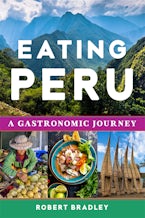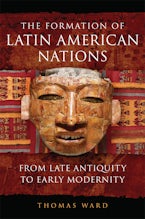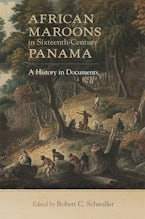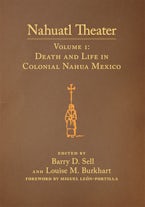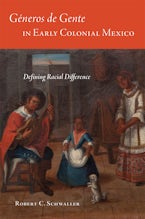HISTORY / Latin America / Central America
Showing results 1-10 of 38
Filter Results OPEN +

The Manuscript Hunter
Brasseur de Bourbourg's Travels through Central America and Mexico, 1854–1859
Coupled with Sainson’s thoughtful introduction and annotations, these captivating, accessible accounts reveal Brasseur de Bourbourg’s true accomplishments and offer an unrivaled view of the birth of Mesoamerican studies in the nineteenth century.
Eating Peru
A Gastronomic Journey
This delightful book is the product of twenty-five years of exquisite digressions from what Bradley might call his “real job"—the culmination of decades of personal discoveries about the food of Peru and the history that led to its current culinary florescence.
The New Catalog of Maya Hieroglyphs, Volume Two
Codical Texts
This long-awaited resource complements its companion volume on Classic Period monumental inscriptions. Authors Martha J. Macri and Gabrielle Vail provide a comprehensive listing of graphemes found in the Dresden, Madrid, and Paris codices, 40 percent of which are unique to these painted manuscripts, and discuss current and past interpretations of these graphemes. Together the two volumes of the New Catalog represent the most significant updating of the sign lists for the Maya script proposed in half a century. They provide a cutting-edge reference tool critical to the research of Mesoamericanists in the fields of archaeology, art history, ethnohistory, and linguistics, and a valuable resource to scholars specializing in comparative studies of writing systems and related disciplines.
Nahuatl Theater
Nahuatl Theater Volume 3: Spanish Golden Age Drama in Mexican Translation
Nahuatl Theater, Volume 3 presents for the first time in English the complete dramatic works of Alva, the only known plays from Spain’s Golden Age adapted into the lively world of Nahuatl-language theater.
Strike Fear in the Land
Pedro de Alvarado and the Conquest of Guatemala, 1520–1541
Written with literary flair, Strike Fear in the Land is an arresting saga of personalities and controversies, conveying as never before the turmoil of this pivotal period in Mesoamerican history.
The Formation of Latin American Nations
From Late Antiquity to Early Modernity
This pioneering work brings the pre-Columbian and colonial history of Latin America home: rather than starting out in Spain and following Columbus and the conquistadores as they “discover” New World peoples, The Formation of Latin American Nations begins with the Mesoamerican and South American nations as they were before the advent of European colonialism—and only then moves on to the sixteenth-century Spanish arrival and its impact.
African Maroons in Sixteenth-Century Panama
A History in Documents
From the 1520s through the 1580s, thousands of African slaves fled captivity in Spanish Panama and formed their own communities in the interior of the isthmus. African Maroons in Sixteenth-Century Panama, a primary source reader, edited by Robert C. Schwaller, documents this marronage in the context of five decades of African resistance to slavery.
“Strange Lands and Different Peoples”
Spaniards and Indians in Colonial Guatemala
Guatemala emerged from the clash between Spanish invaders and Maya cultures that began five centuries ago. The conquest of these “rich and strange lands,” as Hernán Cortés called them, and their “many different peoples” was brutal and prolonged. “Strange Lands and Different Peoples” examines the myriad ramifications of Spanish intrusion, especially Maya resistance to it and the changes that took place in native life because of it.
Nahuatl Theater
Nahuatl Theater Volume 1: Death and Life in Colonial Nahua Mexico
In this volume, Barry D. Sell and Louise M. Burkhart offer faithful transcriptions of the Nahuatl as well as new English translations of these remarkable dramas. Accompanying the plays are four interpretive essays and a foreword that broaden our understanding of these rare works.
Géneros de Gente in Early Colonial Mexico
Defining Racial Difference
Presenting a more complex picture of the ways difference came to be defined in colonial Mexico, this book exposes important tensions within Spanish colonialism and the developing social order. It affords a significant new view of the development and social experience of race—in early colonial Mexico and afterward.

The Manuscript Hunter
Brasseur de Bourbourg's Travels through Central America and Mexico, 1854–1859
Coupled with Sainson’s thoughtful introduction and annotations, these captivating, accessible accounts reveal Brasseur de Bourbourg’s true accomplishments and offer an unrivaled view of the birth of Mesoamerican studies in the nineteenth century.
Eating Peru
A Gastronomic Journey
This delightful book is the product of twenty-five years of exquisite digressions from what Bradley might call his “real job"—the culmination of decades of personal discoveries about the food of Peru and the history that led to its current culinary florescence.
The New Catalog of Maya Hieroglyphs, Volume Two
Codical Texts
This long-awaited resource complements its companion volume on Classic Period monumental inscriptions. Authors Martha J. Macri and Gabrielle Vail provide a comprehensive listing of graphemes found in the Dresden, Madrid, and Paris codices, 40 percent of which are unique to these painted manuscripts, and discuss current and past interpretations of these graphemes. Together the two volumes of the New Catalog represent the most significant updating of the sign lists for the Maya script proposed in half a century. They provide a cutting-edge reference tool critical to the research of Mesoamericanists in the fields of archaeology, art history, ethnohistory, and linguistics, and a valuable resource to scholars specializing in comparative studies of writing systems and related disciplines.
Nahuatl Theater
Nahuatl Theater Volume 3: Spanish Golden Age Drama in Mexican Translation
Nahuatl Theater, Volume 3 presents for the first time in English the complete dramatic works of Alva, the only known plays from Spain’s Golden Age adapted into the lively world of Nahuatl-language theater.
Strike Fear in the Land
Pedro de Alvarado and the Conquest of Guatemala, 1520–1541
Written with literary flair, Strike Fear in the Land is an arresting saga of personalities and controversies, conveying as never before the turmoil of this pivotal period in Mesoamerican history.
The Formation of Latin American Nations
From Late Antiquity to Early Modernity
This pioneering work brings the pre-Columbian and colonial history of Latin America home: rather than starting out in Spain and following Columbus and the conquistadores as they “discover” New World peoples, The Formation of Latin American Nations begins with the Mesoamerican and South American nations as they were before the advent of European colonialism—and only then moves on to the sixteenth-century Spanish arrival and its impact.
African Maroons in Sixteenth-Century Panama
A History in Documents
From the 1520s through the 1580s, thousands of African slaves fled captivity in Spanish Panama and formed their own communities in the interior of the isthmus. African Maroons in Sixteenth-Century Panama, a primary source reader, edited by Robert C. Schwaller, documents this marronage in the context of five decades of African resistance to slavery.
“Strange Lands and Different Peoples”
Spaniards and Indians in Colonial Guatemala
Guatemala emerged from the clash between Spanish invaders and Maya cultures that began five centuries ago. The conquest of these “rich and strange lands,” as Hernán Cortés called them, and their “many different peoples” was brutal and prolonged. “Strange Lands and Different Peoples” examines the myriad ramifications of Spanish intrusion, especially Maya resistance to it and the changes that took place in native life because of it.
Nahuatl Theater
Nahuatl Theater Volume 1: Death and Life in Colonial Nahua Mexico
In this volume, Barry D. Sell and Louise M. Burkhart offer faithful transcriptions of the Nahuatl as well as new English translations of these remarkable dramas. Accompanying the plays are four interpretive essays and a foreword that broaden our understanding of these rare works.
Géneros de Gente in Early Colonial Mexico
Defining Racial Difference
Presenting a more complex picture of the ways difference came to be defined in colonial Mexico, this book exposes important tensions within Spanish colonialism and the developing social order. It affords a significant new view of the development and social experience of race—in early colonial Mexico and afterward.


